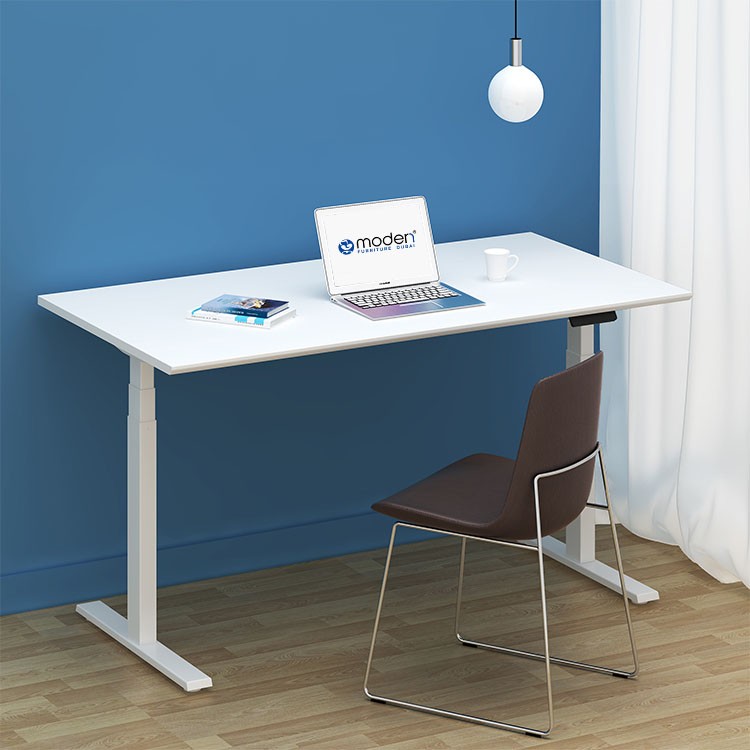
How to Create an Ergonomic Workspace with the Right Desk Setup
Introduction
Creating an ergonomic workspace isn’t just about comfort—it’s about preventing fatigue, improving posture, and boosting productivity. An ideal desk setup should support proper body alignment, reduce strain, and enhance workflow efficiency.
In this guide, we’ll discuss the key elements of an ergonomic desk setup, how to adjust your workspace for maximum comfort, and the best ergonomic office desk to consider.
1. What Makes a Desk Setup Ergonomic.
An ergonomic desk setup is designed to align your body naturally while working, preventing strain on the neck, back, and wrists. Key factors include:
✔ Proper Desk Height – Keeps your arms at a 90-degree angle when typing.
✔ Monitor Positioning – Eye level should be at the top third of the screen.
✔ Ergonomic Chair – Supports the spine and encourages good posture.
✔ Keyboard & Mouse Placement – Should be within easy reach to avoid wrist strain.
✔ Adequate Legroom – Allows you to sit comfortably with feet flat on the floor.
2. Choosing the Right Desk for Ergonomics
A good ergonomic desk should offer height adjustability, ample workspace, and proper support for accessories.
✔ Bugal Pro Series Dual Motor Electric Height Adjustable Standing Desk
Best for: A dynamic and adjustable ergonomic workspace
Features:
-
Electric height adjustment for sitting and standing
-
Smooth and quiet dual-motor system
-
Spacious desktop for multi-tasking
-
Sturdy and durable frame

View the Bugal Pro Series Adjustable Desk
3. How to Set Up Your Desk for Maximum Comfort
✔ Adjust Desk Height
-
Sitting Position: Keep elbows at 90-degree angles while typing.
-
Standing Position: The desk should be at elbow height when standing.
✔ Position Your Monitor Correctly
-
The screen should be an arm’s length away.
-
The top of the screen should be at or slightly below eye level.
✔ Use an Ergonomic Chair
-
Ensure proper lumbar support for lower back comfort.
-
Adjust seat height so feet are flat on the floor.
-
Armrests should allow relaxed shoulders.
✔ Keep Your Keyboard & Mouse Aligned
-
Place your keyboard and mouse at the same height.
-
Use a wrist rest to reduce strain.
✔ Organize Your Desk Efficiently
-
Keep essential items within arm’s reach.
-
Use cable organizers to reduce clutter.
4. Benefits of an Ergonomic Workspace
✔ Reduces Back and Neck Pain – Proper posture minimizes strain.
✔ Boosts Productivity – A comfortable setup leads to better focus.
✔ Improves Circulation – Alternating between sitting and standing enhances blood flow.
✔ Prevents Fatigue – Ergonomic setups reduce stress on the body.
✔ Enhances Work Efficiency – A clutter-free, well-organized space improves workflow.
Final Thoughts
An ergonomic workspace is essential for health, comfort, and productivity. Investing in an adjustable desk like the Bugal Pro Series Standing Desk allows you to customize your workspace for maximum efficiency and comfort.
FAQs
1. What is the ideal desk height for ergonomics?
For sitting, it should be 28-30 inches from the floor. If using a standing desk, the height should match your elbow level when standing.
2. How does an ergonomic workspace improve productivity?
A well-set-up workspace reduces discomfort, improves focus, and prevents fatigue, leading to better performance.
3. Are standing desks better for ergonomics?
Yes! Alternating between sitting and standing helps prevent back pain and improves circulation.
4. What other accessories improve an ergonomic workspace?
✔ Monitor stands to adjust screen height
✔ Footrests for added leg support
✔ Keyboard trays for better wrist positioning


